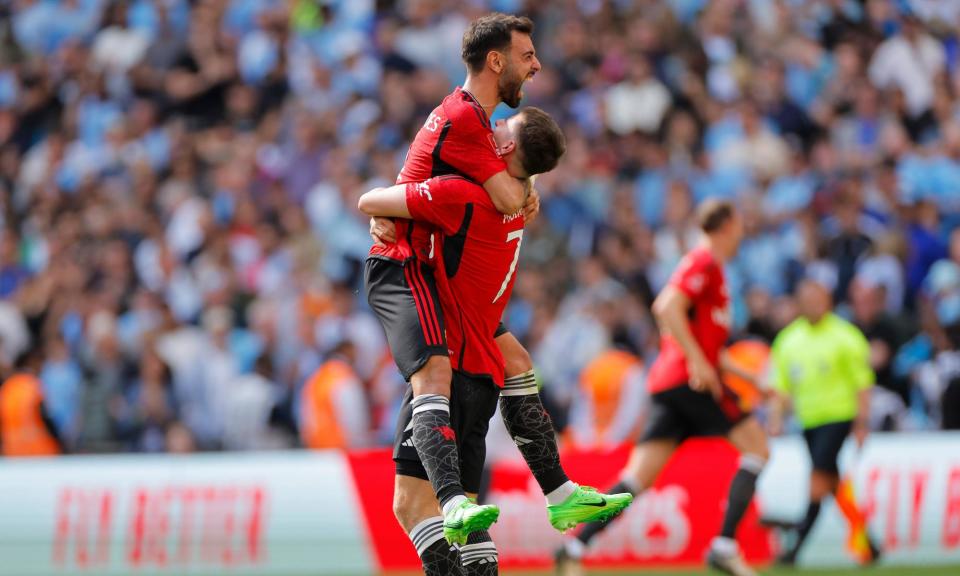Manchester United rediscover their identity in Red Devil redemption

They were still out there an hour later, catching the last few rays of evening sunshine, wringing out this moment for every last drop of joy in it. Everyone wanted a go with the trophy. Some simply hoisted it like a kettlebell. Some hugged it close like a child. There was a time when Manchester United would win these finals, pose for photos and disappear back up the M6. Not now. Everyone knows how precious these moments are, how rarely they can come along, how closely they need to be treasured.
And at the end of this Red Devil redemption, Erik ten Hag sought out the two men responsible. In fact many men had authored this triumph, from the brutal Bruno Fernandes to the indomitable Lisandro Martínez to the inspired André Onana. But Ten Hag wanted a few moments alone with Alejandro Garnacho and Kobbie Mainoo. Ballers; cup final scorers; Wembley heroes; teenagers. Ten Hag clasped them around the ears, ruffled their hair, beamed at them like a proud dad about to go off to war.
Related: Manchester United win FA Cup after Garnacho and Mainoo stun City
Perhaps in retrospect, this was the moment when United’s presents and futures diverged. And amid the elation there was a dissonantly valedictory quality to all this too, the sense of an ending. According to reports, Ten Hag may be about to get the sack. This could well be his final act as United manager. Which of course raises a couple of related but also contradictory questions.
The first: how can you possibly end it like this? For this was not just a great United victory but a great United performance, perhaps even – given its stirring sense of occasion and sheer surprise value – one of the great United performances. It had flair and verve and pace and resolve, a performance that felt like the kind of football a club like United should be aspiring to in 2024.
In recent days we have been told that it would be ridiculous for the new United regime to make a judgment on Ten Hag based on one knockout game. Counterpoint: is this not how most of football, from World Cups to Champions Leagues, is decided? The very nature of sport is that there are some moments when everything is on the line: not just trophies and medals but careers and legacies. Winning these moments is not the be-all and end-all. But it’s ridiculous to argue that they don’t count.
The second question: why can’t United play like this every week? All season Ten Hag has blamed the injuries to Martínez, Raphaël Varane, Luke Shaw, and he did so again here. “When the players are fit, we can play good football,” he said. But injuries happen, and in any case this barely explains on its own why United have so often looked mentally as well as technically deficient, out-matched not just in terms of tactics but desire.
And so to play like this every week would, in a way, be the very antithesis of how United operate. This is a club built for peaks and troughs, a commercial entertainment vehicle in skintight sportswear, and sometimes you beat the four-time champions of England and sometimes you collapse in a heap against Crystal Palace. Ten Hag implicitly recognised this when he laid out his intention to turn United into the world’s best transition team. It tends to work best when you have space to transition into. Not every game is going to be against Manchester City with 27% possession.
For all this, when Ten Hag talked about “playing to our identity”, you finally understood what he meant. If Garnacho’s first goal was a slice of luck, Mainoo’s second – a stunning lacework of passes working the ball long and short, right and left, Marcus Rashford to Garnacho to Fernandes to Mainoo – was the blueprint. Even the late siege – the saves by Onana, the desperate blocks, the close shaves – felt authentically United, a masterclass in resolve and self-belief and simply doing the thing that is required.
What next? There is a new footballing regime in place, a new European campaign to fight, and even if the Glazers are still stinking out the joint, draining the balance sheet and draining the joy, there is at least the sensation of renewal. New faces behind the scenes, new signings in the summer, perhaps even the return of Jadon Sancho (but please, for the love of all holy things, not Mason Greenwood).
And of course it remains to be seen whether this bright future has a place for Ten Hag in it. But either way, he has left an inheritance of hope: a legible playing style, a pair of 19-year-olds who would walk into most clubs in the world, golden memories and a trophy-winning know-how that might otherwise have been mislaid for a decade. It may not be enough to save his job. But Ten Hag has given United back a piece of themselves.

